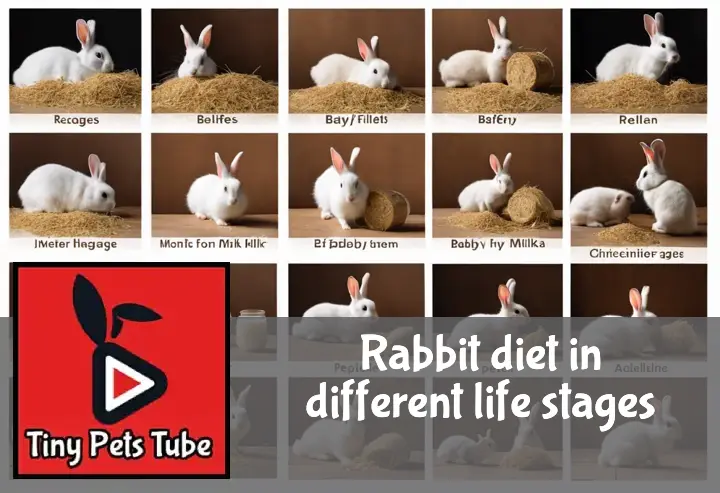Your rabbit’s dietary requirements will change with age. When young, they need food that’ll help them grow big and strong, as adults they’ll want food that keeps them at a healthy weight while providing nutrients, and when elderly they’ll need easily digestible food that won’t upset their tummy or cause them to become underweight. You want to make sure your pet’s growth, development, digestion and weight are optimal, and that’s why you need to give them the right food.
In this article we’ll discuss the subject in detail. First things first, let’s see what the different life stages for rabbits are. If your bunny is a certain age, you can see the section below to figure out whether it’s a baby, or kitten as they are properly called, juvenile, young adult, adult or a senior. We’ve also included some other information that you might find useful, like tips for training and petting your pet rabbit.
1. Baby Rabbits
Baby rabbits, also known as kits, are between 0-8 weeks old. Once their eyes open, kits should be given chewing toys. Their teeth will start to grow soon, so they’ll need some time to get accustomed to the toys. Chewing toys are important because like rats and squirrels, rabbits’ teeth grow throughout their lifetime.
If they don’t chew on hard surfaces to wear them down, their teeth will eventually grow too long, making the rabbit unable to chew. Make sure they have chewing toys all the time, even as adults.
You can pet baby buns once they start moving around. They especially enjoy head and ear pets, because they think you’re grooming them. You can also brush them occasionally if you see any loose fur. Be very gentle with them, especially when picking them up.
2. Juveniles
Rabbits between 8 weeks to 7 months of age are called juveniles. In human terms, they’re kids aged 3-12. Like young children, they’ll be full of energy and will want lots of space for running around in.
You can start litter-training your rabbits when they’re juveniles. Reward good behavior, and make sure you change the hay in the litter box daily. Cat litter isn’t safe for bunnies, who tend to take a few nibbles while resting, which they like to do in their litter box.
It’s also a good idea to train them to come when called. If your rabbits’s past the juvie stage, don’t worry. Older rabbits may take a little longer to train, but they can still be trained.
If your bunny aren’t spayed or neutered, get them fixed before they turn into young adults, because at that stage they’ll start to mark their territory, and acting out in other ways because of hormones. Females can also become aggressive when they are not neutered. Spaying or neutering will protect them from diseases and make them easier to litter-train and handle as well.
3. Young adults
Rabbits aged between 7 months to 1 year are called young adults. They’re still growing, but they won’t grow much bigger, so their nutritional needs are less compared to juveniles.
Rabbits are social animals and will appreciate the company of other rabbits. They can play together and groom each other, which is necessary to stay clean. Just make sure they’re fixed, otherwise, you’ll end up with another dozen rabbits in the blink of an eye, and a very weak mama rabbit, and you probably don’t want that.
It’s important to keep an eye on your bunny’s health at this stage. Check their teeth, eyes, and ears regularly. Also, provide them with plenty of hay and water. As always, avoid feeding them any food that can be harmful to their digestive system. They’ll also need regular exercise, so give them plenty of space to run around. Keep their living space clean by cleaning their litter box every day.
4. Adult rabbits
Rabbits between 1 and 6 years of age are considered adults. At this age, they’re fully developed and hopefully trained as well.
Make sure they still have chewing toys, or they’ll chew on your furniture and damage it. Hide or protect cables as well, because rabbits love chewing on cables.
Take your adult bun for annual check-ups to make sure they’re in good shape. At this stage they’re pretty easy to care for. As long as they aren’t gaining or losing much weight and don’t have digestive problems, all’s well.
5. Elderly rabbits
Rabbits over 6 years old are considered seniors and require special attention. Regular health checks, including blood tests, are necessary as your pet may have health issues at this age. Don’t skip these tests as they are important in detecting any potential problems early.
Elderly rabbits are more prone to stomach upsets, pain, and other health issues. Keep an eye on your friend and monitor their behavior closely to ensure they are not experiencing any problems. If you notice any changes in their behavior or appetite, contact your veterinarian immediately.
If your bunny is afraid of going to the vet, you can accompany them during their visits. Most veterinarians will allow you to stay close by while they draw blood or perform other procedures. This can help to keep your rabbit calm and reduce their stress levels during the appointment.
As your rabbit ages, you may need to make adjustments to their living arrangements to ensure they are comfortable. Provide soft and comfortable bedding and make sure they have easy access to food, water, and litter. Spending extra time with your senior rabbit, providing love and attention, and engaging them in gentle play can also improve their quality of life.
Remember, if your rabbit has become a senior, you should consider yourself a good caretaker by providing them with the love and care they need in their later years.
How to feed your rabbit at different life stages
Feeding Baby Bunnies
Young kits are quite easy to care for, and only feed on their mother’s milk for the first three weeks.
The first couple of days after birth, their mother’s milk will have high levels of antibodies that’ll help protect the young rabbit from diseases. It’s important that you don’t separate the kit from its mother at this stage.
After three weeks, the baby can be given some alfalfa hay and pellets. It’ll take them some time to get used to it, so don’t worry if they seem to eat very little of it. They also need mother’s milk at this stage.
By the time the kit is seven weeks old, they can usually eat hay well, and around the time they’re 8 weeks old, they’ll be weaned.
Being weaned means that the baby will be able to eat food other than its mother’s milk.
Feeding juvenile rabbits
You can give juveniles access to unlimited alfalfa hay and pellets.
When your bunny is three months old, you can start introducing veggies to its diet. Vegetables have lots of nutrients, plus they’ll help diversify your bun’s diet and make their digestive system stronger. Hold off on fruits, however. They’re too sugary and can cause digestive problems.
You can give them leafy greens like watercress, parsley, collard greens and spinach (in small quantities, spinach has high oxalates which aren’t good for buns in large quantities), veggies like broccoli leaves and stems, beet tops (not the root, but the stems/leaves), mint leaves, edible pea pods and watercress. Some others include pesticide-free dandelion greens and romaine lettuce (light colored varieties like iceberg can be harmful, definitely avoid those).
Introduce one veggie at a time in small amounts, and observe the rabbit closely to see if it’s digesting it well. If they show any signs of distress or an upset stomach like gas, bloating, pain, odd behavior, diarrhea, reduced appetite, avoid giving them that vegetable in the future.
If your pet seems seriously ill, take them to the vet immediately.
Introduce the rabbit to timothy, grass hays and oat hay which should be available throughout the day. Hay contains fiber, which bunnies need to digest food properly. Young adults don’t need as much alfalfa hay or pellets, because they’re high in nutrients and calories, and rabbits don’t need large amounts of either once they’re young adults. Restrict their pellet intake to around half a cup of pellets per 6 lbs of body weight daily. You can give your pet some more rabbit safe vegetables to make up for the decrease in pellets, and you can start introducing him to fruits.
Bear in mind, however, that fruits tend to be fattening for rabbits, so give them small amounts only. To much sugary fruits can also upset the rabbits sensitive digestive system. The general rule is to have 85% of their diet be pellets and hay, and 10-15% can be fruits and veggies, with the focus being strongly on healthy veggies
Feeding adult rabbits
Adult rabbits have different dietary requirements than young rabbits. Here are some guidelines for feeding adult rabbits:
Adult rabbits should have unlimited access to timothy, grass hay, and oat hay. Make sure that the hay is fresh and not moldy.
You should cut back their pellet intake to one-fourth of a cup per 6 lbs. of body weight daily, or half the amount you were giving them as young adults.
Adult rabbits can consume more vegetables than young rabbits. You can increase their vegetable intake up to two cups per 6 lbs. of body weight daily. Make sure to offer dark green, leafy vegetables, as well as dark orange and yellow vegetables.
Introduce one vegetable at a time in small amounts, and observe the rabbit closely to see if it’s digesting it well. If they show any signs of distress or an upset stomach like gas, bloating, pain, odd behavior, diarrhea, reduced appetite, avoid giving them that vegetable in the future.
Fruits should be given in small quantities, as rewards for good behavior or occasional treats. They are too sugary and can cause digestive problems if given in large amounts.
Feeding Senior Rabbits
As rabbits age, they may experience digestive and weight loss problems. To ensure their nutritional needs are met, it’s important to be careful about what you feed them.
Senior rabbits can generally be fed the same as adult rabbits, but you may need to adjust their diet if they have weight loss problems. It’s important to monitor their pellet intake and avoid sugary treats, which can exacerbate digestive issues. If your rabbit does experience digestive problems following treats, it’s best to cut back.
In some cases, veterinarians recommend giving sugary foods such as sweet potatoes and carrots to help with weight issues. Bunnies who have low or normal calcium levels may be given alfalfa hay to help with weight issues as well. However, we recommend consulting a vet before making any dietary changes.
If you have concerns about your senior rabbit’s diet or general health, it’s important to contact your local veterinarian or rabbit breeder. Finding someone who specializes in rabbits and storing their number on your phone can be helpful for quick access.
There are also online veterinarians that you can ask questions to for free, such as the site PetCoach. To find other online veterinarians, you can search terms like “online veterinarian” or “ask a veterinarian” on Google.
See safe foods and treats in the Rabbit Food section. Remember to subscribe to the YouTube channel for weekly animal videos


